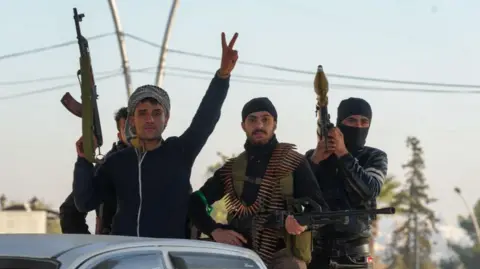Physical Address
304 North Cardinal St.
Dorchester Center, MA 02124
Physical Address
304 North Cardinal St.
Dorchester Center, MA 02124

 Getty Images
Getty ImagesRebel forces launched their biggest offensive against the Syrian government in years on Wednesday.
By Sunday, they had taken control of “large parts” of the country's second-largest city, Aleppo, and were advancing on Hama in the south.
The surprise offensive prompted the first Russian strikes on Aleppo since 2016. this way and saw that the Syrian military was withdrawing its troops from the city.
The attack was led by the Islamist militant group Hayat Tahrir al-Sham (HTS), which has a long and involved history in the Syrian conflict.
 Reuters
ReutersHTS was created under another name, Jabhat al-Nusrain 2011 as a direct affiliate of Al Qaeda.
The leader of the self-proclaimed Islamic State (IS) group, Abu Bakr al-Baghdadialso participated in its formation.
It was considered one of the most effective and deadly groups against President Assad.
But its jihadist ideology seemed to be its driving force rather than revolutionary fervor – and at the time it was seen as at odds with the main rebel coalition under the banner of Free Syria.
And in 2016 the group's leader, Abu Mohammed al-Jawlani, publicly broke with al-Qaeda, disbands Jabhat al-Nusra and creates a new organizationwhich took the name Hayat Tahrir al-Sham when it merged with several other similar groups a year later.

The war in Syria for the past four years felt like it was actually over.
President Bashar al-Assad's rule is essentially unchallenged in the country's major cities, while some other parts of Syria remain outside his direct control.
These include Kurdish-majority areas in the east that have been more or less separated from Syrian state control since the early years of the conflict.
There has been ongoing, if relatively subdued, unrest in the south, where the revolution against Assad's rule began in 2011.
In the vast Syrian desert, the self-styled Islamic State group's holdouts still pose a security threat, especially during the truffle-hunting season, when people head to the area to find the highly lucrative delicacy.
And in the northwest, Idlib province is held by militant groups driven there at the height of the war.
HTS, the dominant force in Idlib, is the one that launched the surprise attack on Aleppo.
For several years, Idlib has remained a battleground as Syrian government forces attempt to regain control.
but 2020 ceasefire agreement with the mediation of Russiawhich has long been a key ally of Assad, and Turkey, which has backed the rebels, has largely held back.
About four million people live there – most of them displaced from towns and cities that Assad's forces have recaptured from rebels in a brutal war of attrition.
Aleppo was one of the bloodiest battlefields and represented one of the biggest defeats for the rebels.
To achieve victory, Assad relies on Russian air power and Iranian military assistance on the ground – mainly through Iranian-sponsored militias.
They include Hezbollah.
There is no doubt that the setback that Hezbollah has suffered recently The Israeli Offensive in Lebanonas well as Israeli strikes against Iranian military commanders in Syria, played a significant role in the decision by jihadist and rebel groups in Idlib to make a sudden, unexpected move against Aleppo.
 Getty Images
Getty ImagesHTS has for some time established its power base in Idlib, where it is the de facto local administration, although its efforts at legitimacy have been tarnished by alleged human rights abuses.
It has also been involved in some bitter infighting with other groups.
Its ambitions beyond Idlib have become unclear.
Since breaking with al-Qaeda, its goal has been limited to trying to establish fundamentalist Islamic rule in Syria, rather than a broader caliphate, as IS has tried and failed to do.
So far, it has shown no signs of trying to reignite the Syrian conflict on a large scale and renew its challenge to Assad's rule over much of the country.
Additional reporting by Maya Davis.